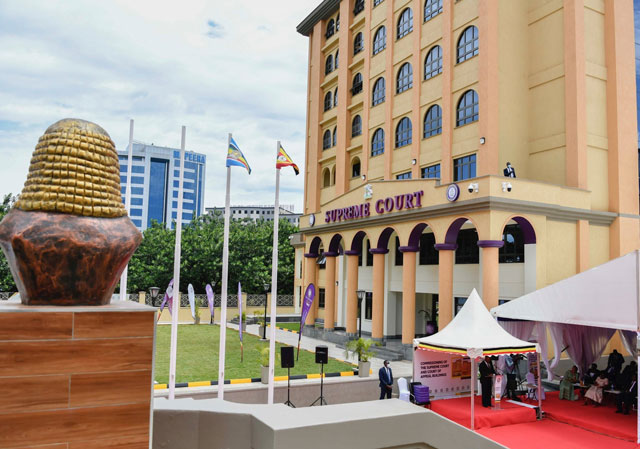
Kampala, Uganda | THE INDEPENDENT | The Supreme Court has delivered another landmark ruling indicating that Civil Courts do not have the powers or jurisdiction to hear appeals filed by soldiers tried and convicted by Military Courts. This was a unanimous decision delivered on Wednesday by five Supreme Court Justices, led by Professor Lillian Tibatemwa, in the case of Lt. Ambrose Ogwang, a UPDF officer who was found guilty of murder by the Court Martial and subsequently sentenced to 29 years in prison. Ogwang sought to overturn his conviction and subsequent sentence.
The other Justices are Justice Mike Chibita, Catherine Bamugemereire, Christopher Izama Madrama, and Stephen Musota. Ogwang’s case began on May 23, 2010, when he allegedly robbed a shop at gunpoint in Mbale City along Kumi Road. He was pursued by police to houses along Kumi Road, where, while attempting to evade arrest, he shot and fatally injured Inspector George William Koire using an SMG rifle.
Ogwang was tried, convicted of murder, and sentenced to death by the UPDF 3rd Divisional Court Martial. He appealed the decision to the General Court Martial, which substituted the death penalty with life imprisonment. He then appealed to the UPDF Court Martial Appeal Court, which upheld the conviction and sentence. Ogwang’s subsequent appeal to the Court of Appeal was successful, as the court quashed his conviction and set aside the sentence. However, the Office of the Director of Public Prosecutions indicted Ogwang on two counts of murder and aggravated robbery.
He was retried in the High Court, acquitted of aggravated robbery, but convicted of murder and sentenced to 29 years and 2 months in prison. Ogwang appealed the decision to the Court of Appeal, which dismissed the appeal against conviction and affirmed the sentence. Ogwang then appealed to the Supreme Court on four grounds, including that the learned justices of the first appellate court erred in mixed law and fact when they constituted themselves with one panelist who ought to have recused himself, thus denying the appellant an impartial and fair hearing of his appeal.
He also argued that the learned Justices of Appeal erred in mixed law and fact for failure to objectively re-evaluate the improbable evidence of two State witnesses regarding his participation, thus misdirecting themselves on evidence of spent cartridges, gunshot residues, and a confession allegedly made at the police. Ogwang further faulted the Court of Appeal Justices for having erred in law when they declined to reduce his sentence, thus overlooking the irregularities of the trial court and material mitigating factors.
He also argued that the Justices at the first appellate court erred in mixed law and fact by sanctioning the trial, his conviction, and the sentence arrived at in abuse of retrial proceedings, which could have been stayed pending Supreme Court appeal. However, before the Supreme Court could hear the appeal, Chief State Attorney Joseph Kyomuhendo raised a preliminary point of law, arguing that the appeal was incompetent, having been founded on an illegality that occurred under the watch of the learned justices of the Court of Appeal.
He submitted that the Court of Appeal lacked jurisdiction to entertain an appeal from the Court Martial Appeals Court. Kyomuhendo further argued that an appeal is a creature of statute, and since the People’s Defence Forces Act, 2005, does not provide for appeals from the Court Martial Appeals Court to the Court of Appeal, the Supreme Court did not have jurisdiction to entertain Ogwang’s appeal. He emphasized that the Act only provides for appeals from the Court Martial to the General Court Martial, and then to the Court Martial Appeal Court.
Kyomuhendo also pointed out that Regulation 20(2) of the Court Martial Appeal Court Regulations 307-7, which purports to give an appellant from the Court Martial Appeals Court a right of further appeal to the Court of Appeal, is inconsistent with the Constitution and the People’s Defence Forces Act, 2005. He argued that since the regulation contradicts the Parent Act, it is null and void.
In their decision, the Supreme Court upheld the preliminary objection, ruling that it did not have jurisdiction to entertain appeals from the Court Martial. The court held that the right to appeal is created by statute, and since the People’s Defence Forces Act, 2005, does not provide for such an appeal, the Supreme Court did not have jurisdiction to entertain Ogwang’s appeal.
“In the present case, the UPDF (Court Martial Appeal Court) Regulations were not designed to infer or confer jurisdiction to the Court of Appeal or indeed any other court, without explicit authority from the statute itself. The UPDF Act serves as the ‘mother law’ governing the Uganda People’s Defence Forces. However, it does not explicitly bestow jurisdiction upon the Court of Appeal to hear appeals from the Court Martial Appeal Court. Therefore, a ministerial regulation conferring military jurisdiction upon a civilian court is ultra vires. The act of the minister creating an appeal through regulation was ultra vires and void ab initio,” held the Justices.
The Justices explained that in the instant case, the Minister acted ultra vires by purporting to create appeals in respect of sentences of death and life imprisonment to the Court of Appeal, a mandate not granted in the ‘Mother Act.’ “The right to appeal is created by statute. Where the legislature did not provide for an appeal in the Uganda People’s Defence Forces Act 2005, or by other law in force in Uganda, a Minister cannot introduce jurisdiction by way of regulation. We, therefore, conclude that it was ultra vires of the minister to make regulations to provide that appellants sentenced to life imprisonment by Court Martial Appeal Courts had recourse to appeal to the Court of Appeal,” held the Justices.
However, the Justices noted some exceptions, such as where the primary legislation explicitly grants the power to make regulations that can amend the primary legislation or where specific provisions allow for the amendment of primary legislation through subordinate legislation. The Justices of the Supreme Court ruled that if the framers of the UPDF Act wanted civil courts to have jurisdiction over their appeals, they would have given them those powers in the Act.
“It is intriguing to note that nowhere does the UPDF Act mention the role of civilian courts in its appellate frameworks and hierarchy. It can be inferred that since the UPDF Act is silent on the role of civilian courts, no jurisdiction is conferred upon them. Indeed, one may impute that had the legislature intended that the civil courts should have jurisdiction over Military Court Martial Courts, it would have purposefully provided for the jurisdiction by law,” held the Justices.
In his submission, Ogwang relied on Regulation 20(2) of the UPDF (Court Martial Appeal Court) Regulations to assert that the question of jurisdiction to civilian courts from the court martial was settled law. However, the Supreme Court Justices found that Regulation 20(2) introduced confusion in the appellate jurisdiction of the court. “In the present case, we can safely conclude that the appellant, being a soldier, was properly tried by the military court martial courts,” reads the judgment.
The Supreme Court hopes that their discourse in this appeal will provide some clarity and certainty in this area of the law. “We reiterate that an appeal is a creature of statute. In other words, if the makers of the UPDF Act had intended that an appeal could lie in the Court of Appeal from a sentence of life imprisonment, they would have categorically stated so. The UPDF Act is unambiguous about the powers vested in the minister, as described in Section 105(2)(t) of the UPDF Act….,” they stated.
Regarding confirmation of the death sentence, the Supreme Court ruled that Section 6(1) should be read together with Section 6(a) and Section 6(7) of the Law Revision (Penalties in Criminal Matters) Miscellaneous (Amendment) Act 2019, which grants the Supreme Court as the highest appellate court in the land a supervisory role over the death penalty.
It states that “(7) A sentence of death imposed by a court of judicature or a court or tribunal established under the Uganda People’s Defence Forces Act, 2005 shall only be carried out after it has been confirmed by the highest appellate court and upon an order of the President issued under subsection (6)(a).”
Accordingly, they indicated that the UPDF Regulations, which had given the Civil Courts jurisdiction to hear appeals where a soldier has either been sentenced to death or life imprisonment, are inconsistent. Ogwang’s appeal has therefore been dismissed for lack of jurisdiction, and he will serve a life sentence for murder.
******
URN
 The Independent Uganda: You get the Truth we Pay the Price
The Independent Uganda: You get the Truth we Pay the Price


